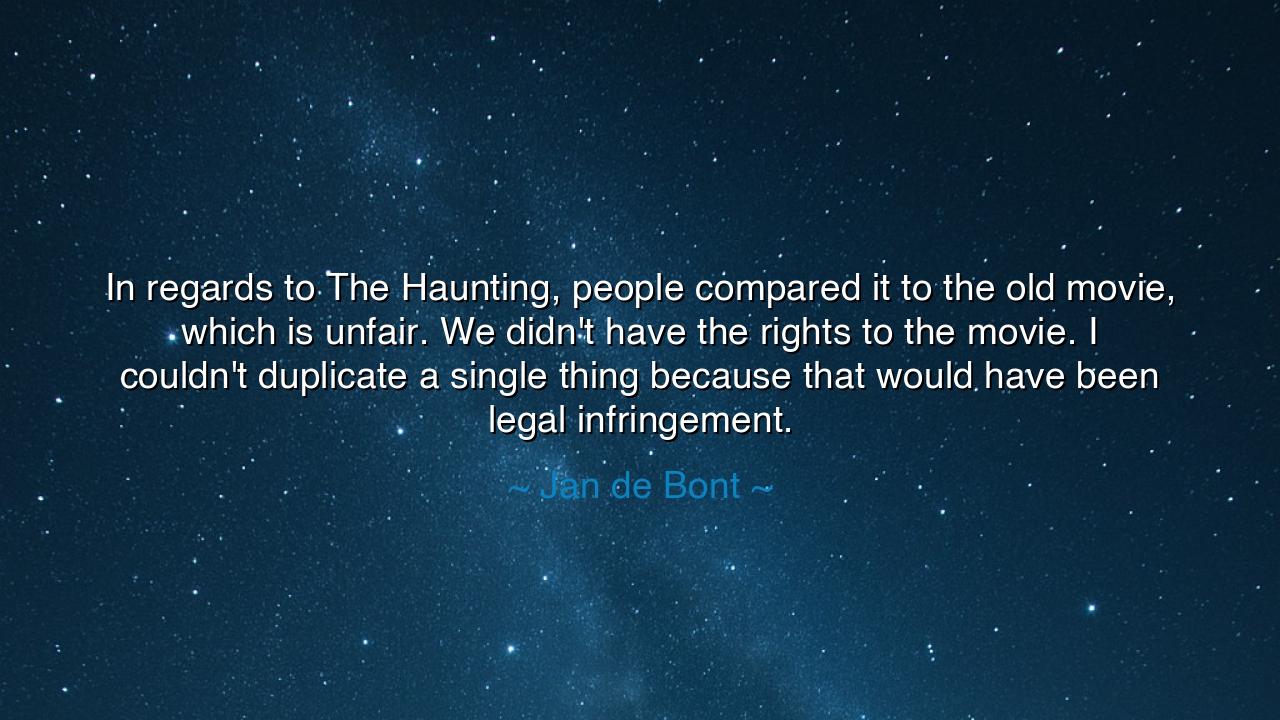
In regards to The Haunting, people compared it to the old movie
In regards to The Haunting, people compared it to the old movie, which is unfair. We didn't have the rights to the movie. I couldn't duplicate a single thing because that would have been legal infringement.






When Jan de Bont said, “In regards to The Haunting, people compared it to the old movie, which is unfair. We didn’t have the rights to the movie. I couldn’t duplicate a single thing because that would have been legal infringement,” he spoke not only as a filmmaker defending his craft, but as an artist reminding the world of the sacred boundary between creation and imitation. His words reveal a struggle as old as art itself — the battle between inspiration and limitation, between the freedom to reimagine and the chains of legality that guard the past. Beneath his frustration lies the eternal lament of every creator who must build anew, even when the shadow of what came before still looms large.
The origin of this quote lies in the release of de Bont’s 1999 adaptation of The Haunting, a modern retelling of Shirley Jackson’s gothic novel The Haunting of Hill House. Audiences and critics drew comparisons to the 1963 classic film of the same name, directed by Robert Wise — a film celebrated for its subtle horror and psychological tension. Yet de Bont’s team did not hold the legal rights to that earlier adaptation, only to the novel itself. He was forbidden by law to replicate scenes, dialogue, or artistic choices from the previous movie. What many saw as deviation or creative arrogance was, in truth, necessity born of legality. His words are a reminder that even the artist’s vision must bend to the structures of ownership and law.
This tension between art and law, between imagination and permission, has echoed through history. In the days of Michelangelo, when artists sought to emulate their masters, they risked accusations of sacrilege or theft. The great Greek sculptors learned to honor their predecessors not by copying their forms, but by transcending them. The same was true of playwrights who followed Sophocles and Euripides — they could not simply retell the old myths in the same words, for the laws of the city and the pride of the people demanded innovation. So too did Jan de Bont face the same ancient test: how to create something new under the burden of legacy. His challenge was not only technical, but spiritual — to honor a lineage without trespassing upon it.
In his lament, we also hear a universal truth about expectation and judgment. Humanity often compares what is present to what has passed, rarely understanding the invisible constraints that shape creation. The painter is judged against the masters, the writer against the canon, the modern architect against the ruins of antiquity. Yet each age has its own boundaries — whether of law, of culture, or of conscience. De Bont’s defense is, therefore, more than personal; it is the cry of every soul who labors under the weight of comparison. To be told to “do better” without the freedom to “do the same” is the paradox of all modern art.
Yet within limitation lies a seed of originality. For when an artist is forbidden to imitate, he is forced to innovate. The legal restriction that barred de Bont from recreating the 1963 film compelled him to seek a different path — to employ new visual effects, new storytelling rhythms, new tones of fear. In this, his quote teaches an ancient lesson: that constraint is often the mother of invention. The greatest works of history were born not from endless liberty, but from the narrow corridors of necessity. Just as the sculptor finds form within the unyielding marble, so too must the artist find expression within the limits imposed by law.
But de Bont’s words also remind us of the fragility of artistic legacy. What once inspired the world becomes guarded by contracts and clauses, its spirit imprisoned by legal ownership. In the ancient world, stories were passed freely from tongue to tongue — Homer’s verses, the myths of the gods, the fables of the East — all were shared, reshaped, reborn with each generation. But in the modern age, the storyteller must navigate a maze of permissions to retell what the heart remembers. De Bont’s frustration thus mirrors a deeper sorrow — that the inheritance of culture has been fenced off by law, where once it flowed like water through the generations.
And so, the lesson is clear: every artist must walk the line between reverence and rebellion. The laws that protect art must also challenge the artist to rise beyond imitation. To create within limitation is to forge something authentic — a voice that belongs wholly to the present. The wise must learn to respect the past without becoming enslaved to it, to see boundaries not as prisons but as frameworks for invention. For as Jan de Bont’s experience shows, even when the gates of the past are locked, the spirit of creation finds another road. And that road — though born of restriction — often leads to the truest form of freedom.






AAdministratorAdministrator
Welcome, honored guests. Please leave a comment, we will respond soon